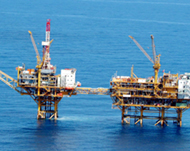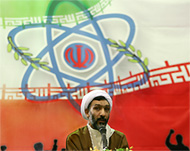Russia, China discuss energy needs
The Russian and Chinese presidents have agreed to increase energy co-operation, with Russian gas giant Gazprom saying it will try to help China with some of its unmet energy needs.

Vladimir Putin, who has made energy security the theme of Russia’s current presidency of the G8 group of industrialised nations, said in November that diversifying energy export routes was a top priority, with supplies to Asia of paramount importance.
But Zhang Guobao, China’s top energy planner, has called the slow movement in Russian plans for new pipelines “regrettable” and criticised the Russian government’s unwillingness to support Chinese efforts to invest in Russia’s energy sector.
President Putin arrived in Beijing on Tuesday accompanied by Russia’s senior energy chiefs, including Alexei Miller, the chief executive of Gazprom. China’s Xinhua news agency said the two sides signed three deals on oil and natural gas co-operation.
Miller said two pipelines from Russia would eventually supply China with 60 billion to 80 billion cubic metres of gas a year. He said Gazprom had signed a memorandum on gas supplies with CNPC, the Chinese oil and gas conglomerate.
Frustrations
Details of the gas deal were not available, but it may go some way to mollifying Chinese leaders, who have indicated their frustration at a lack of progress in boosting Russian oil and gas imports.
But the meeting between Putin and China’s president, Hu Jintao, produced only broad agreement about energy co-operation.
|
“The energy organisations and companies of both countries will continue active work to advance oil and gas pipeline projects” |
“We support investment in both countries to develop oil and gas resources and the energy potential of Russia and China,” the two sides said in a joint statement.
“The energy organisations and companies of both countries will continue active work to advance oil and gas pipeline projects.”
China has been seeking access to Russia’s vast oil and gas reserves as its dependence on imports has increased in recent years, but it has been unable to pin its neighbour down.
Also accompanying the Russian leader were Viktor Khristenko, the energy minister, and Yuri Trutnev, the resources minister, as well as Sergei Bogdanchikov, the head of state oil firm Rosneft.
Chinese needs
China wants Russia to agree a possible oil pipeline deal for 30 million tonnes per year as well as natural gas supplies to feed its booming economy.
But there were no indications of a significant breakthrough in Putin’s meeting with Hu.
 |
|
China and Russia are expanding |
Khristenko said on Tuesday that there could be no progress on an oil pipeline to China until there had been a feasibility study.
Asked if there was any date for the building of the pipeline, he said: “We will only be able to answer that once we’ve done the feasibility study.
“We intend to build it. There is nothing forbidding it, but first there should be a feasibility study according to the rules.”
Putin and Hu also discussed the international stand-off over Iran’s nuclear plans, which Washington and its allies say are tilted to making atomic weapons.
Iran issue
Moscow and Beijing have deflected Western measures to authorise UN Security Council threats against Iran and urged a negotiated solution, and the two leaders agreed to continue seeking to defuse the dispute “by political and diplomatic means”.
China has backed a Russian compromise proposal that would allow Iran to use nuclear fuel enriched in an internationally monitored plant on Russian soil, easing fears that Tehran could divert atomic material to weapons development.
Russia is also participating in six-party talks, hosted by China, directed at ending North Korea’s nuclear ambitions, but which have been repeatedly delayed.
Asia interest
Russia is already involved in China’s own nuclear power programme, and it may be looking for more deals. Sergei Kiriyenko, Russia’s nuclear power chief, also travelling with Putin, plans to extend his trip to travel to the Tianwan plant which Russia is helping to build.
 |
|
The two leaders also discussed |
China has said Russia’s continued involvement at Tianwan, in the eastern province of Jiangsu, depends on the strength of its work on the first two generating units, which are due to go on stream towards the end of this year.
China plans to build 27 nuclear plants in the next 15 years and Russia intends to tender for every project, Itar-Tass news agency reported after a briefing by Kiriyenko last week.
Russia, which plans 40 new nuclear plants on its own territory by 2030, also wants to offer re-processing facilities to developing countries, enabling them to gain nuclear power while removing material that could be used for making weapons.